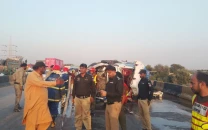The brutality brigades

Other kinds of rivalry have reduced regions to zones where the rule of law has completely collapsed. For the second time in a few week the Taliban in a village near Miramshah in North Waziristan captured men they held were US spies, tied explosives to their bodies and detonated them in public. We have no way of knowing why the summary executions were carried out. In the past such horrific acts of violence have been used to settle petty scores or rivalries within village communities. Quite obviously the law of the jungle holds sway in a part of the country. Even the last shreds of civilisation appear to have vanished, wafting away into the breeze that constantly carry the smell of fresh blood. How is this to end? Are we ever to rediscover humanity and the essential spirit that separates thinking men from animals? The fact that the violence has continued for so long — month after month, year after year — means that it will be harder to push it back. Sadly we have allowed the chaos we see now to gradually overtake us. Even now there seems to be no real military commitment to an operation in North Waziristan that could free the region from the demon-like hold of the militants. It is crucial however to keep in mind that mere military effort will never be enough. Indeed there is an argument that holds the bombings and gunfights in the north have in some ways acted to perpetuate the brutality and add a growing sense of bitterness which leaves ordinary people even less able to adjust to peace. The ability to live in harmony with neighbours is after all an acquired one, created by the many systems — both persuasive and coercive — that exist within societies and are intended to maintain order.
How do we set about the business of restoring order in the societies of the north? Sadly, there are no easy solutions. But much depends on creating the means to allow people to live ordinary lives — by offering them employment, opportunity, education and with this hope. This after all is crucial to human existence. Without something to dream about, to aspire for, life becomes rather meaningless. This is what has increasingly happened in our north. The process that led up to it is rooted in years of state neglect of people. It is only when this is reversed that we can have any hope of a return to a less brutal existence. One example is the apparent revival of a semblance of tourism in Swat valley. A festival has also been organised by the Khyber-Pakhtunkhwa government along with the Pakistan Army to draw attention to the district’s immense potential for tourism, potential that was being quite well realised till the Taliban took it over in 2009. Tourism is a very good example of how people of a region affected by war and conflict could — once the militancy is brought to an end and the area cleared of violence — stand on their own feet and rebuild their lives.
Published in The Express Tribune, July 18th, 2010.


















COMMENTS
Comments are moderated and generally will be posted if they are on-topic and not abusive.
For more information, please see our Comments FAQ